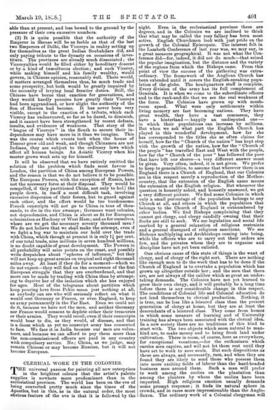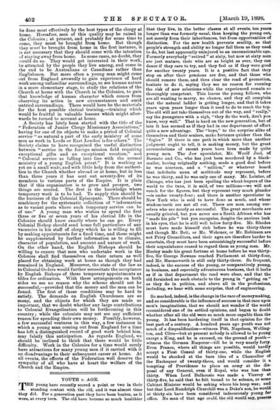CLERICAL WORK IN THE COLONIES. T HE universal passion for painting
all new enterprises in the brightest colours that the artist's palette supplies is nowhere more predominant than in the ecclesiatical province. The world has been on the eve of being converted pretty much since the times of the Apostles, but in this, as in the natural order, the most obvious feature of the eve is that it is followed by the night. Even in the ecclesiastical province there are degrees, and in the Colonies we are inclined to think that what may be called the rosy fallacy has been most active. English Churchmen look with just pride on the growth of the Colonial Episcopate. The interest felt in the Lambeth Conference of last year was, we may say, in a, great measure geographical. It was not what the Con- ference did—for, indeed, it did not do much—that seized the popular imagination, but the distance and the variety of the regions from which the Bishops came. From this point of view the success of the gathering was extra- ordinary. The framework of the Anglican Church has been extended until it covers the English-speaking popu- lation of the globe. The headquarters staff is complete. Every division of the army has its full complement of Generals. It is when we come to the subordinate officers and to the rank-and-file that we see the real weakness of the force. The Colonies have grown up with mush- room speed. What were only settlements within living memory are fast becoming nations. They have great wealth, they have a vast commerce, they have a hinterland — happily an undisputed one — in which their populations can increase by millions. But when we ask what part the English Church has played in this wonderful development, how far she has corresponded to the titles she so often claims for herself, bow far the "Church of the nation" has kept step with the growth of the nation, how far the "Church of the people "has travelled East and West with the people, how far the " Church of the poor" has followed the poor that have left our shores—a very different answer must be given. Very often, indeed, it is not given. We prefer to keep to generalities, to assume that wherever there is an England there is a Church of England, that our Colonies are in this respect merely a reproduction of the Mother- country, that the extension of the English name means the extension of the English religion. But whenever the question is honestly asked, and honestly answered, we get a very different picture. We find some Colonies in which only a, small percentage of the population belongs to any Church at all, and others in which the population that belongs to the Church of England is outnumbered by other bodies. We find Bishops complaining that they cannot get clergy, and clergy candidly owning that their flocks are still to seek. We see legislation and social life marked by a general relaxation of religious restraints and a general disregard of religious sanctions. We see Bishops multiplying and Archbishops coming into being, while the officers who are to carry out their orders are few, and the privates whom they are to organise and discipline have not yet been enlisted.
One obvious cause of this state of things is the want of clergy, and of clergy of the right sort. There are nothing like enough men to do the work that has to be done if the Church of England is to overtake a population which has grown up altogether outside her ; and the men that there are, are not always of the calibre which so great an under- taking demands. The Colonies have not yet learned to grow their own clergy, and it will probably be a long time before there is any considerable change in this respect. The conditions of Colonial life and Colonial education do not lend themselves to clerical production. Nothing, it is true, can be less like a leisured class than the present generation of clergy at home, but they are at least the descendants of a leisured class. They come from homes in which some measure of learning and of University training has always been associated with the clerical idea. In a new society there are no traditions of this kind to start with. The two objects which seem natural to man- kind are, to make money and to bring fresh land under cultivation. There is room, of course, here as everywhere, for exceptional vocations,—for the enthusiasm which carries men captive, and will not let them rest until they have set to work to save souls. But such dispositions as these are always, and necessarily, rare, and when they are found they are likely to send those who possess them into more exciting fields of labour than the hard-headed business men around them. Such a man will prefer to work among the coolies on the plantation than among the planters by whom the coolies have been imported. High religious emotion usually demands some prompt response ; it finds its natural sphere in crowds, and in races more impressionable than the Anglo- Saxon. The ordinary work of a Colonial clergyman will be done most effectively by the best types of the clergy at home. Hereafter, men of this quality may be raised in the Colonies ; at present, and probably for some time to come, they must be brought from home. But though they must be brought from home in the first instance, it is not necessary that they should come with the intention of staying away from home. In some cases, no doubt, they would do so. They would get interested in their work, be attracted by the people they live among, and come in the end to be Australians or Canadians rather than Englishmen. But more often a young man might come out from England avowedly to gain experience of hard work among unfamiliar surroundings, to see human nature in a more elementary stage, to study the relations of the Church at home with the Church in the Colonies, to gain that knowledge of human character which comes from observing its action in new circumstances and amid untried surroundings. There would here be the materials for the best possible clerical training,—training which would be fruitful in valuable lessons which might after- wards be turned to account at home.
A Society has lately been started with the title of the "Federation of Junior Clergy Missionary Associations," having for one of its objects to make a period of Colonial service "as natural a part of the early ministry of some men as work in Leeds or East London is for others." The Society claims to have recognised the useful distinction ,between " service in the foreign mission field requiring exceptional gifts and an exceptional vocation," and "Colonial service as falling into line with the normal ministry of a young English priest." It is working as yet on a small scale, and with little help from the authori- ties in the Church whether abroad or at home, but in less than three years it has sent out seventy-five of its members to various parts of the Empire. It is plain that if this organisation is to grow and prosper, two things are needed. The first is the knowledge where temporary work is to be had. To supply this should be the business of the Colonial Episcopate. There should be machinery for the systematic collection of "information as to vacant posts where such temporary service can be of use." A young man who wishes to spend the first three or five or seven years of his clerical life in the Colonies should know exactly where be can go. Every Colonial Bishop should send home full particulars of any vacancies in his staff of clergy which he is willing to fill by making appointments for a fixed time, and these might be supplemented by further information as to climate, character of population, and amount and nature of work. On the other hand, the English Bishops should be willing to ensure that men who undertake work in the Colonies shall find themselves on their return as well placed for obtaining work at home as though they had remained in England. Moreover, the state of the law as to Colonial Orders would further necessitate the acceptance by English Bishops of these temporary appointments as titles for ordination. With these arrangements on both sides we see no reason why the scheme should not be successful,—provided that the money and the men can be found. The first of these conditions may be hard to satisfy. The demands on English Churchmen are so many, and the objects for which they are made so important, that we doubt whether any large contributions to Colonial Evangelisation will be forthcoming in this country ; while the colonists may not see any sufficient reason for spending their own money. Possibly, however, a few successful ventures in this way, a few instances in which a young man coming out from England for a time has left a distinguished record of good work behind him, may falsify this anticipation. As regards England, we should be inclined to think that there would be little difficulty. Work in the Colonies for a time would surely have attractions for many young men if it carried with it no disadvantage to their subsequent career at home. At all events, the efforts of the Federation well deserve the sympathy of all who have at heart the welfare of the Church and the Empire.







































 Previous page
Previous page